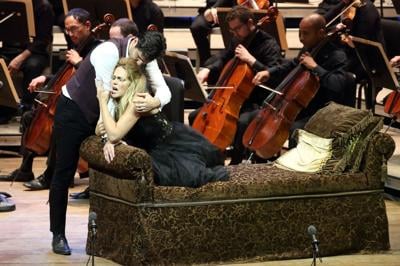LENOX — For Puccini's s "La boheme" to cast its spell of Parisian gaiety, love at first sight and ultimate heartbreak, who said you need a gargantuan spectacular like director Franco Zeffirelli's, first mounted at the Metropolitan Opera in 1981 complete with a horse and donkey strutting across the stage?
Certainly not Boston Symphony music director Andris Nelsons, who led an intense, deeply moving, well-cast performance at Tanglewood on a sticky, stormy Saturday night. The production was shorn of scenic splendor but imbued with a keen grasp of Puccini's slice-of-life realism, depicting four artistic bohemians living on the edge of poverty in 1830s Left Bank Paris.
Call it semi-staged, concert-staged or "concertante," as Nelsons does, this most familiar opera is just as effective, perhaps even more so, when focused on the music and the characters.
"I have done `boheme' so many times, but when we play it with the Boston Symphony, they give such extra colors which I haven't heard, and they play it almost like a symphonic piece," Nelsons commented during a recent backstage conversation. "You can close your eyes and just listen to the amazing music sung by wonderful singers." He also cited Tanglewood's natural setting, which contributes to a nocturnal operatic atmosphere.
Certainly, there was no sense of routine as the BSO performed its first-ever complete `boheme' with a cast of mostly veteran singers, some basic props, period costumes and far more than a token effort to create theatrical drama and comedy, as stage-directed by Metropolitan Opera staffer Daniel Rigazzi.
As Mimi, the ill-fated seamstress who stumbles her way into poet Rodolfo's life, soprano Kristine Opolais remains among the most convincing interpreters of Puccini's doomed heroines.
Opolais, despite her glamorous demeanor, captures the fragility of a simple girl captivated by Rodolfo, but destined to succumb to "consumption" (as tuberculosis was known then). Her voice has taken on a deeper, richer sheen and she always plays her romantic scenes to the hilt.
As a substitute for highly regarded tenor Piotr Becza a — graciously released by the BSO so he could replace Roberto Alagna in title role in Wagner's "Lohengrin" at Bayreuth in Germany — Chilean-born tenor Jonathan Tetelman made a valiant effort in his BSO and Tanglewood debuts.
Though he was underpowered early on, he gained vocal heft in Acts 3 and 4, especially during intimate scenes where his artistry and sincerity were apparent.
The ardent Act 1 love duet, performed with suitable rapture by Tetelman and Opolais, survived a thunderous downpour, ironic given the opera's Christmas Eve setting in the bohemians' dismal attic.
Susanna Phillips turned in a robust, seductive portrayal of Musetta, the coquettish gold-digger and temptress who reveals her angelic benevolence in the final act. She played the role for impudence and amusement during the Cafe Momus scene in Act 2, and her vocally thrilling performance of the famous waltz deserved its show-stopping ovation.
As Rodolfo and his friends romp through mischievous merrymaking in Acts 1 and Act 4, it would be hard to imagine a stronger ensemble, especially baritone Franco Vassallo as the painter Marcello, the rightfully jealous lover of Musetta who reconciles with her before Mimi's death, and bass-baritone Luca Pisaroni, the philosopher Colline who sings nostalgically as he plans to pawn his worn overcoat to help buy medicine for Mimi. Pisaroni captured the essence of the warm-hearted support these previously light-hearted bohemians offer during Mimi and Rodolfo's darkest hour.
Portraying the musician Schaunard, Elliot Madore, a last-minute substitute, was suitably jocular and vocally adept.
In the dual roles of the landlord Benoit, swindled out of his rent by his impoverished tenants, and Alcindoro, the foppish dandy tormented by Musetta to arouse Marcello's jealousy, the beloved, now-retired Metropolitan Opera bass Paul Plishka offered a poignant reminder of one of opera's great careers.
Members of the Tanglewood Festival Chorus crowded the front of the stage during the rambunctious Latin Quarter scene, costumed as townsfolk, shopkeepers, street vendors, soldiers and waiters, joined by the recently formed Boston Symphony Children's Choir in their official, highly impressive debut. The TFC singers, prepared by BSO Choral Director James Burton, performed with vibrancy and conviction, and the children's choir compared favorably with the storied Metropolitan Opera Children's Chorus.
Nelsons, a leading Puccini interpreter, provided a remarkably sensitive account of the death scene, avoiding melodramatics yet observing the composer's skull-and-crossbones notation in the score's margin, requesting a "long pause" to mark the moment of Mimi's passing. The freeze-frame suspension of music and action was breath-stopping, and ineffably sad.
The BSO's successful approach to concert-hall staging of opera and musical theater remains one of the most-welcome among the many achievements of Nelsons' tenure as music director.
Clarence Fanto can be reached at cfanto@yahoo.com, on Twitter @BE_cfanto or at 413-637-2551


